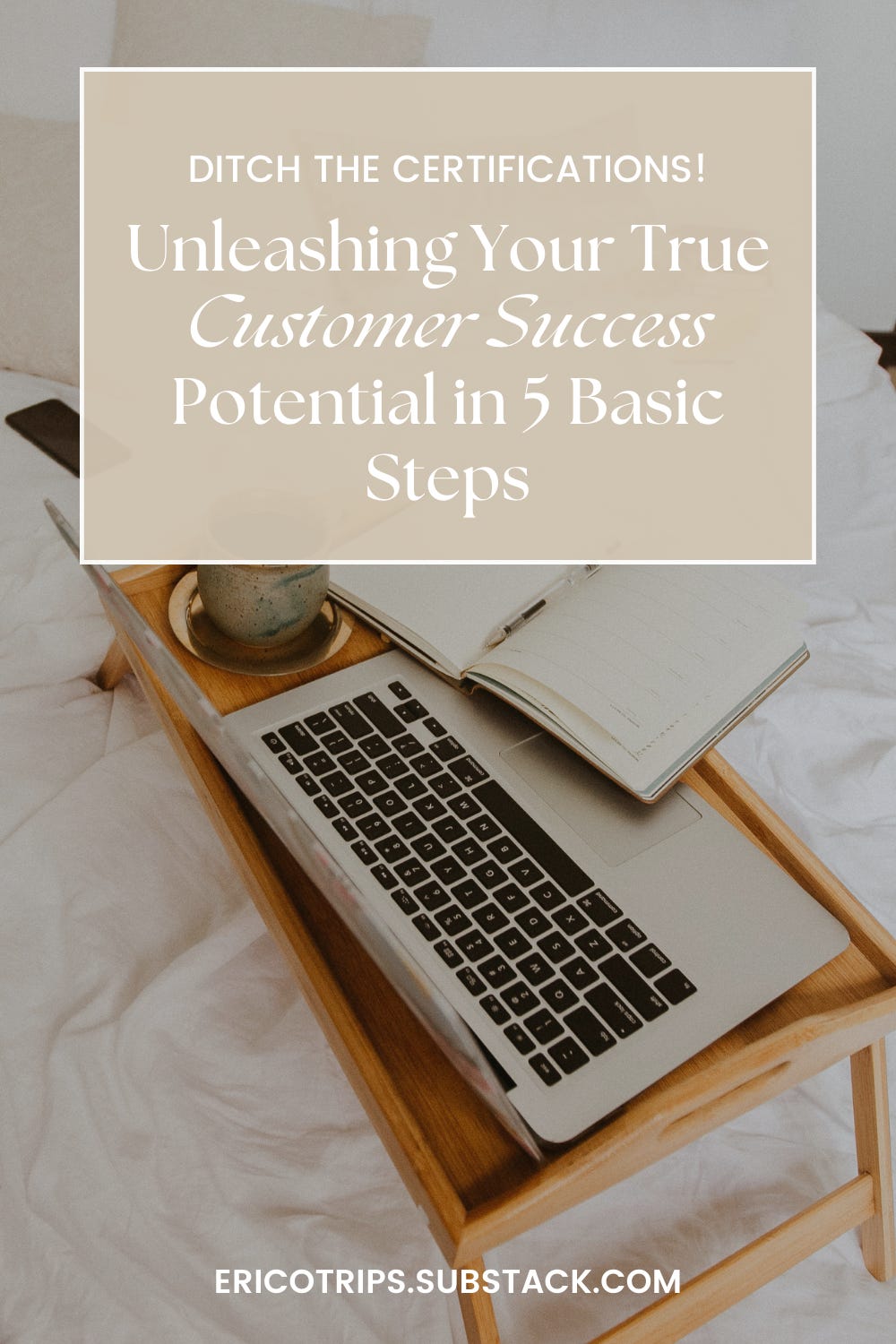Ditch the Certifications! Unleashing Your True CUSTOMER SUCCESS Potential in 5 Basic Steps
Should we all be CCSMs first or...?
As Customer Success continues to evolve and transcend more industries at home and abroad, there's no mistaking how certifications are being considered as a crucial aspect of career progression. And, recruiters are not entirely wrong, you know.
However, I firmly believe that in the endless chase for plaques and badges from Google, SuccessCOACHING, Cisco, Practical CSM, or Hubspot, it’s super easy to skip foundational soft skills that leave more impact than chanting, "I'm a Certified Customer Success Manager (CCSM),” each time you walk in an interview.
Adds a nice touch to your name, right? CCSM! But for how long?
You see, while certifications undoubtedly hold value, there are experience-driven approaches that can help you (especially entry-level) make a greater breakthrough in your customer success career if you just scale on the vitals.
Building Blocks of Customer Success: Invest in These 5 Vital Skills From Today
#1. Understand Your Employer's Business and Embrace Inter-Teamwork
When I started a full-time Customer Success role, I had my break in cybersecurity.
Beforehand, I’d only known about viruses and a few computer thingies from school days, however, this was a somewhat specialist field that required me to have a hint of the niche at least.
I’d like to advice you: Learn as much as you can about your employer’s business.
Read industry news online, subscribe to your company’s newsletter, be inquisitive, listen to podcasts, and most importantly, brainstorm ideas with other teams.
As I write, I now know a thing or two about security engineering; compliance standards; cyber offense and cyber defense, that is, red teams and blue teams respectively. I’m not nearly there yet, but I’m progressively poking around.
Learning your employer’s business empowers you to lecture customers on your offerings from an in-depth perspective and certifications don’t always hammer this.
#2. Rewire Your Mind to Also See ARR as Value
As a profession, Customer Success can be very focused on relationship-building, ensuring satisfaction, and managing expectations (business goals). With a minute concentration on ARR - Annual Recurring Revenue.
ARR refers to the predictable income from your B2B or B2C customers year on year.
But why are these figures important?
Having this knowledge empowers every CSM to know the buying power or influence of customers they are constantly in touch with.

Now, imagine pushing a solution that’s 11 figures to a customer whose ARR is 7 figures on average.
How’d that work? It won’t. Unless a miracle.
There are many other benefits from realizing these numbers but you won’t know until you start. Rewire your “CS mind” today.
#3. In Chasing the Bags, Do Not Skip Relationship-Building
After harping about ARR, I can still categorically share with you that seeing customers as cash cows is disadvantageous to you, and your employer’s business.
Chase the money, yes. Size up their pockets and purchasing power, affirmative. But do not make the mistake of becoming money-centric and ditch relationship-building.
Simply put, it’s irritable in the long haul.

No customer will be delighted to only hear from you when it’s time to renew, upsell, or schedule sessions.
Customer engagement should also include check-ins, for example.
#4. Help the Next Man. Punch That Data in the CRM
I can’t believe we have to go back to the basics, but this is a problem, it seems.
Customer Relationship Management (CRM) software exists to help you work with the right data. Not just you, but your colleagues as well.

If you’re having challenges learning the software, whether your organization uses Zoho, Salesforce, Freshworks, Microsoft Dynamics, or something “more innovative” in-house, reach out to your team lead for onboarding sessions.
When it’s difficult, learn yourself from YouTube videos and sprint courses.
#5. Master Follow-Ups. Let BCOB Be BCOB
One of the most attractive traits among humans is keeping your word.
Be dependable.
When you make promises to customers, try to ensure you surpass those expectations even if it means delegation of certain tasks.
In Conclusion: Certifications Hold Little Value if You Still Lack Proficiency in Crucial Areas
By exploring these five strategies, you can pave the way for personal growth, professional development, and ultimately, exceptional outcomes with your customers.

It’s time to challenge the notion that certifications are the sole determining factor for success because they’re not.
What soft skills have you acquired that popular certifications couldn’t teach you?
This is not a diss at certification-holders in the CS niche. Ah, I'm chasing a few myself.




Thank you for sharing, really insightful.
I totally agree!
I personally check out courses to learn new concepts and perspectives I can incorporate into my career.
Certificates don’t translate to proficiency if you don’t build experience on the knowledge acquired.
Ultimately, CS recruiters don’t ask for certificates, but for experience-built CS skills.